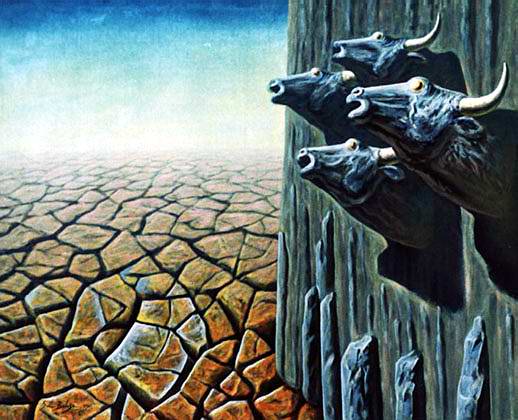The narrator in Dostoevsky’s Demons, irritated with a magazine article reporting the wreck of a steamer, says: “The whole article, quite a long and verbose one, was written with the sole purpose of self-display. One could simply read it between the lines: ‘Pay attention to me, look at how I was in those moments. What do you need the sea, the storm, the rocks, the splintered planks of the ship for? I’ve described it all well enough for you with my mighty pen. Why look at this drowned woman with her dead baby in her dead arms? Better look at me, at how I could not bear the sight and turned way. Here I am turning my back; here I am horrified and unable to look again; I’ve shut my eyes—interesting, is it not?’”
It would be easy to see such self-display in a world where it is an exception. But how would we see it in a world where it is not an exception? In such a world it would no longer be a self-display, but instead would become the very atmosphere. Soon this atmosphere–one that places self-display above the “drowned woman with her dead baby in her dead arms”–would become a part of our learned experience, and of the stuff that forms the very ingredients of our culture.
Our culture has morphed into such a state. “How will they receive me?” is the question that occupies our waking hours.
Societies lose their moral intelligence this way everywhere and all the time, but when it happens in the culture of our own country of birth–India–it rankles. An astonishing world reveals itself in such a society. It reveals the character of men who live in this world, and it shows a disturbing absence of moral sensibility. You see this world, and you see its man–our fellow Indian man–carrying himself with his “whole body permeated by exquisite shame.” (in Alice Munro’s words from her story “What Is Remembered.”) So exquisite that there is nothing to be shameful about.
Loud and articulate they may be, our writers, those amplified loudspeakers of our inner vices, nevertheless have a responsibility to show us the measured distance we walked away from such moral intelligence. No doubt, even without the writers our view of right and wrong is clear enough to us even from this moral desolation, but only as a sport-at-a-distance is clear enough to a spectator. Like a juvenile who becomes hurt at a mere mention of his vice, we haven’t immersed ourselves in adult life yet.
In times such as these it occurs to me that our Indian nation’s people ought to live as though there are other sensations in addition to touch, taste, smell, sight and sound. Recollection, too, is a sensation. Men–especially our Indian men–ought to live in a constant recollection of our past; of our abuse of women and children; of our rampant discrimination, catching up to us.
An honest man amongst us would say, rightly, that we would’ve been a vastly better people if we were schooled in the craft–the actual skill–of recognizing the moments in our daily lives that require us to act morally, and carry on this task no matter how exhausting it may be, just as we are schooled to learn the not-so-intuitive skill of how to drive and carry on driving no matter how chaotic the city traffic gets.
But we have no such schools. Instead, we ask our women to rely implicitly on our culture–that background stuff of assumptions, values and traditions–for a guarantee that a man will not rape them.
I am going to claim, without sufficient proof, that our culture provides no such guarantees. So widespread is this epidemic of failure of our men.
If there is a wealth of moral experience somewhere in the hearts and minds of the people’s of India–we have to believe there is–then we haven’t seen our men and our politicians show it in their actions. And so it is evident that the issue lies with the communication and distribution of this moral experience into our culture, into our background, so all men acquire a boldness to live a moral life.
I believe that there is one particular quality in us Indians that determines how we can become good at communicating and distributing our moral experiences. That quality is our ability to relate. We urgently need a school to develop this quality of relatedness in us. And it is literature and literary criticism, more than any other teacher, which give us a set of skills and perspectives to distinguish the varieties of this quality of relatedness.
So, let us write, and relate.
Featured image credit: The Crisis, by Sabin Balasa (WikiArt.org)









????
Sir,మీరు,రాసినవాటికి, తెలుగు అనువాదం, దొరుకుతుందా?